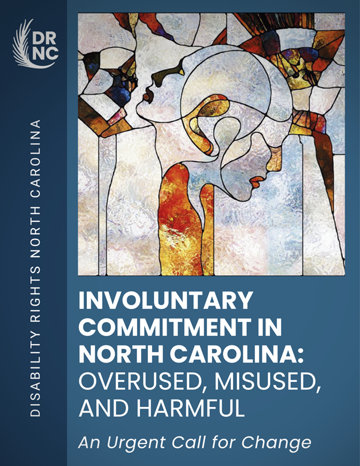Indeed, Disability Rights North Carolina, in a yearlong study of the use of involuntary commitment [IVC] in the state, concluded: “What was once meant to be a narrowly applied intervention has devolved into a widespread, expensive, wasteful and abusive practice that is failing those it purports to help.
“We rely on costly emergency department and psychiatric hospital care instead of care in communities that costs far less and is more effective.”
“This is almost like science fiction to me.”
After reviewing and analyzing IVC actions between 2019 and 2024, the study states: “From data that is reported, we know that of the tens of thousands of petitions [filed] for IVC each year, at least 63 percent over the past six years did not result in an order for involuntary commitment, indicating they did not meet the criteria for forced hospitalization.”
Even though most IVC petitions are ultimately rejected, that judgment comes only after a person has endured the ordeal—hauled from their home, shackled, transported by police, confined for days or weeks, subjected to strip searches, drugged and/or restrained—all before anyone has determined they even qualify for commitment.
So the trauma comes first, and the decision that it was unjustified comes later, if at all. Each violation of a victim’s human and civil rights can therefore be inflicted for no reason.
Yet, again and again, it happens.

Entitled “Involuntary Commitment in NC: Overused, Misused and Harmful,” the report’s executive summary concludes that the state’s IVC process involves a lack of due process of law. “People are detained in EDs [Emergency Departments] under civil custody orders without appointed legal representation or timely judicial oversight. They remain in legal limbo, often for days, weeks or months.”
The detention is traumatic, with even children “subjected to strip searches, physical restraints, forced medication, handcuffs and shackles in transport, and long periods in EDs, some noisy, harshly lit and chaotic, with little to no treatment.
“The IVC process often excludes parents and guardians from decisions, disrupts lives, causes job loss and financial hardship, and consumes law enforcement and hospital resources unnecessarily,” the report states.
To make matters worse, this process is often misused by nursing homes to offload patients, or by family and friends wanting to control or exact their revenge on someone.
That’s because it’s not hard to have someone involuntarily committed in North Carolina—not hard at all. All you need is a cooperative magistrate.
With that in place, anyone—even a participant in a divorce or custody battle wanting to strike back at a recalcitrant spouse—can become a petitioner and request that a magistrate order an involuntary commitment.
“There is very little due process, but there is full deprivation of liberty.”
Magistrates aren’t required to know anything about mental health or the IVC process. They receive only four hours of training on IVC out of their 40 total training hours. If they wish, they can follow this up with a two-day IVC training course, but only 20 magistrates each year—or about 2.8 percent of the 700 magistrates in North Carolina—bother to do so.
Despite this lack of training, magistrates can and often do order people into involuntary commitment. And a forced commitment can follow a person for life, making it illegal for anyone who has undergone IVC to own a firearm, serve in the military or law enforcement, or participate in hunting or shooting sports—unless their record is expunged.

“NC must transform its mental health system from one rooted in abuse, coercion, trauma, inefficiency and waste to one centered on prevention, dignity and effective care,” the report states. “People with mental health needs deserve healing, not harm. They deserve support in their communities, not detention in emergency rooms.”
The study continues: “The potential harm to affected individuals is severe, including being taken into custody—loss of liberty—without legal representation until much later in the process.”
“This is almost like science fiction to me,” one hospital emergency department worker said. “I am watching what is happening to human beings and wondering, are we actually helping people?”
Custody orders last for seven days while the emergency department tries to find an available bed for the “patient” in a psychiatric facility. If a placement opening is not found, then the custody order can be renewed for another seven days. Then another. And another.
It can take weeks to find a bed and the “patient” may remain trapped in the hospital in the meantime, a prisoner of the state’s medieval system.
“The laws weren’t written with the knowledge it may take days, weeks or months to get a bed,” Dr. Micah Krempasky, chief medical officer for Mental Health and Well-Being for WakeMed Health and Hospitals, said. “I don’t think anyone wants that.”
IVC victims certainly don’t want that, but until they are assigned to a psychiatric facility, there is no opportunity for judicial oversight, or for them to get an attorney and fight to be released.
“There are cases where the respondent is held for weeks without legal representation or a hearing,” Mark Botts, an associate professor and IVC expert at the School of Government at the University of North Carolina at Chapel Hill, said. “You can have successive custody orders, each one for a seven-day period. All of this happens before they even get to a psychiatric facility, and unless and until they get to a psychiatric facility, they are not going to be provided counsel. There is very little due process, but there is full deprivation of liberty.”
“In my opinion, the IVC process is broken,” said Rusty Miles, director of the ED at Carteret Health Care.
The report contains scads of recommendations for full systemic changes in the IVC procedure. But rather than that, how about we eliminate the dehumanizing process altogether?
North Carolina would be in great company if it did so. Both the United Nations Office of the High Commissioner for Human Rights and the World Health Organization have called for a complete end to involuntary commitment.
With a dismal record like North Carolina’s, wouldn’t it be wise for the state to join them?






















